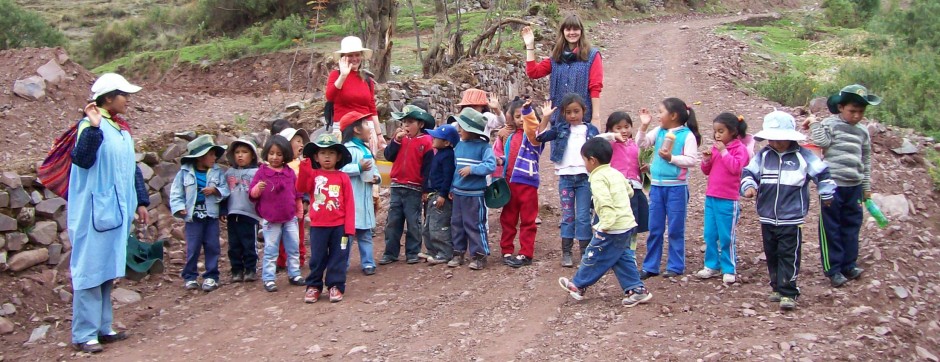CONTINUED FROM THE SEPTEMBER NEWS!
After dinner, which may or may not be around a table, activities wind down and there may be time for conversation, card games or black and white TV if they have electricity and a set. Of course, nobody has “cable TV” and the meager offerings from the capital city Lima are not exactly educational or uplifting, to say the least.
The children go to bed at the same time as the adults / there may be only one bed, or one room for living and sleeping. So the children have the same rhythms as their parents – sleeping and eating-wise. Because the children often are awake until late hours of the night, they suffer greatly when in school, often being tired and unable to focus or concentrate.
Of course, some of the ladies have houses with more than one room and one bed, but my kind reader must not have any illusions that these conditions are in any way similar to their own however modest dwellings. In general, the ladies who work at the Q’ewar Project have no showers, having only a kitchen sink (inside or outside) from which to wash themselves. Some have a W.C.
Saturday, the Q’ewar ladies bring their children to the Project where they are lovingly taken care of in Wawa Munakuy while their mothers work in various ways – in the workshops, managing the women that come from high above Andahuaylillas to spin wool, knit or weave cloth for all the beautiful clothes that the Q’ewar dolls wear. Making plant dyes for the wool fibers, taking a knitting class or learning how to weave – all are part of the Saturday rhythms. Julio told me that it is optional whether the Monday thru Friday doll makers stay all day, or come at all.
Sunday is the day of the week which has a different character to it. The ladies laughed when I suggested it was a day to rest or have a little fun! They told me it was their day to do the family laundry (by hand, outside, using only cold water and harsh detergent in a plastic tub); it was their day to clean the house, shop for food in the next pueblo and get ready for the week ahead. Some of the ladies might go to the small Catholic Church in the village, but I did not ask who attended.
One of the ladies told me, with great animation, that HER favorite time was when there was a fiesta, with dancing and drinking chicha (a strong Peruvian beer made from fermented corn or grain). All the women told me that generally conversation was the one pastime they could have each day that was their way of relaxing. At the Q’ewar Project, there is a quiet tranquil atmosphere which is conducive to conversation and all the ladies truly enjoy their hours at the Project. There is no pressure or stress to “race against time” to complete their work and with warm and well lit workshops, each woman has found a place in which to find community and friendship.
An important postscript to the life of the Q’ewar ladies that I have just elaborated above is to say that the women are completely free to come to work or not. Most come very regularly, but the bottom line is that they come when they choose to come. No contracts have been signed. They are paid for the work they do when they come. Some have family obligations or other reasons why they may not show up for work on a given day. Usually they ask Julio or Lucy for permission to leave if it is an extended time away from the Project. Julio told me that the answer is always “Yes”!
The home life of each Q’ewar worker is multifaceted, sometimes austere, and often very harsh. Yet, somehow they are all changing in the environment of the Q’ewar Project, having space and time to create lovingly such beautiful, “soulful” dolls for others to enjoy. They are finding friendships, help when in need and new skills to apply in and out of the Q’ewar workshops.
Please write us with your questions or comments! We always love to hear from our many friends around the world!
Spring/Autumn Greetings to All!
